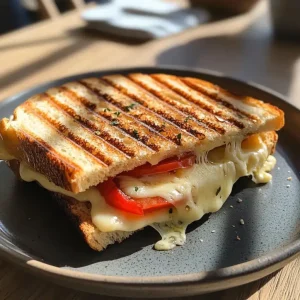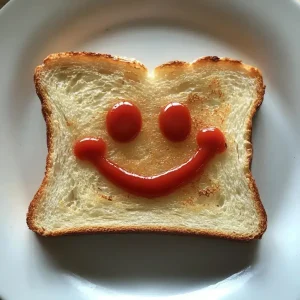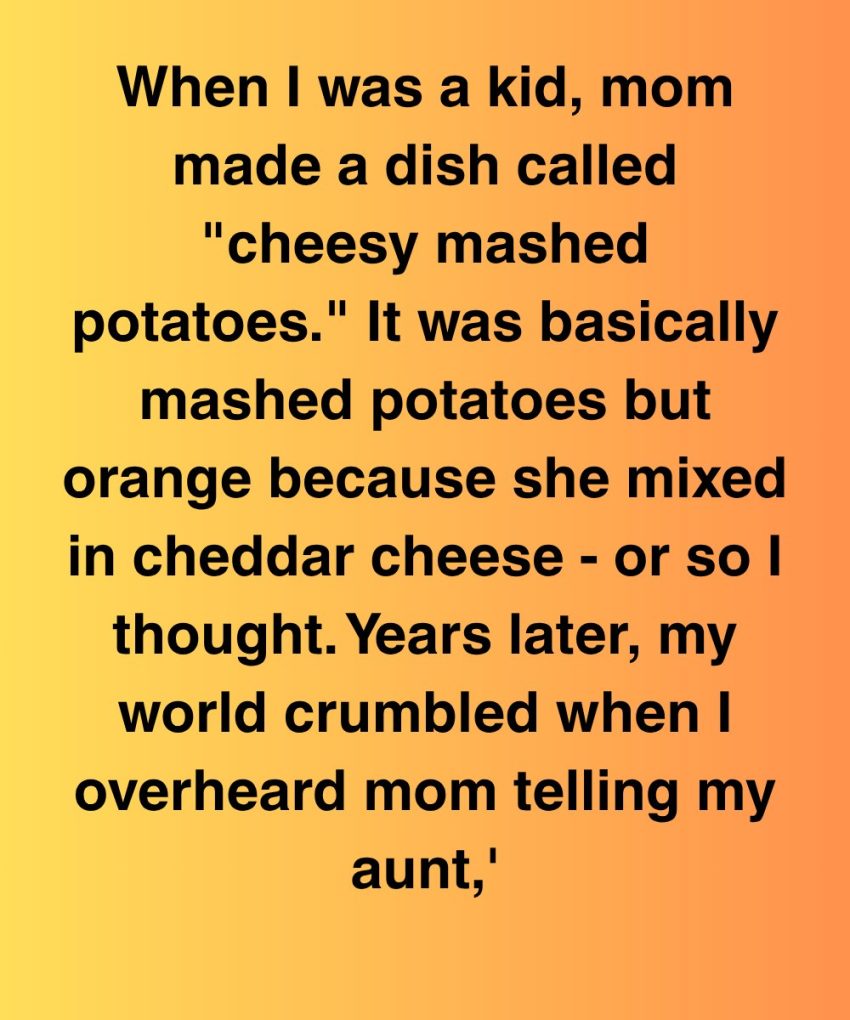When I was a kid, my mom used to cook cheesy mashed potatoes for dinner. I thought it was just mashed potatoes with cheese on top. Years later, my world fell apart when I heard Mom tell my aunt, “We didn’t have enough money for real cheese, so I used those government blocks—they melted better anyway.”
I remember being stuck in the hallway. I was about 22 years old and home for the summer from college. It didn’t make me mad, but it felt different. That dinner made me feel better. It tasted like birthday feasts and sick days, and like going home after winning a spelling bee or getting my knees scraped. I thought it was love in a bowl. It was, in fact, survival.

I didn’t say anything at the time. I calmly went into the kitchen, drank a glass of water, and stared at the linoleum floor while Mom talked in the other room as if she hadn’t just ruined a childhood memory. It wasn’t the false cheese that bothered me; it was realizing how hard she must have worked to keep things quiet back then.
That idea started to fill in a lot of gaps over the next few weeks. For example, Aunt Nadiya’s kids always “gently used” our things, and when the power went out for a few hours, Mom would light candles like it was a game. Or how “Property of Cascade Mental Health” was written in fading Sharpie on the bottom of my lunchbox in third grade. I assumed it was just a weird name for a brand.
I asked Mom about it one night. “Hey, do you remember those cheesy mashed potatoes you used to make?” I commented while we were folding the clothes.
She smiled and replied, “That’s your favorite.”
I nodded. “Was it really cheese from the government?”
She stayed still. Just kept folding. “Yes.” The orange brick stuff that was in the pantry package. I had to use a knife to shave it because it didn’t arrive pre-shredded like the fancy kind.
I don’t know what I was hoping for. A sorry? A reason? But she just kept folding socks like it was no big deal.
And maybe it wasn’t.
But that moment broke something in me. I started asking more questions, not just about the food but about everything. Why we had to move three times in one year. Why Dad always seemed to “have a project out of town” over the holidays. Why we didn’t have a landline phone when I was a kid.
I didn’t think Mom had so much to do.

Dad wasn’t a deadbeat, but Mom called him “casually unreliable.” On the Fourth of July, he would bring a lot of fireworks, but he would miss birthdays and sometimes rent payments. He was nice and interesting, but he couldn’t take on any responsibilities at all. She didn’t trust him anymore when I was nine.
That’s when she started cleaning houses on the side. She would go on Saturdays with a mop in one hand and her Walkman clipped to her jeans. I always thought she was going to do aerobics. I didn’t learn out until much later that she was cleaning toilets in homes three villages away, and sometimes I was sleeping in the car outside.
I started carrying everything with me to college. Not like a burden, but like a strange kind of safety. I remembered how Mom would make spaghetti last for three days when other kids complained about the cafeteria food. I remembered scraping the last bit of peanut butter out of a jar with a butter knife while my roommate threw out a tub of yogurt because it was “a little watery.” We wouldn’t get any more until next paycheck.
But I never told anyone. Not really.
I graduated, took a job in marketing in Chicago, and started living what I thought was the “real” adult life, which included wine nights, cooking meals, and talking about work drama with friends. But that old stuff was still there. It got louder, if anything.
I started sending Mom a little money every month, even though she insisted she didn’t need it. I knew she was still cleaning houses since she said she liked being busy, but I also saw that she stopped more often while she was standing up or that she would “forget” to get new glasses even though hers were crooked.
Then there was the turn that I didn’t see coming.

I was getting ready to move up in my job. There was a guy named Marten who always wore Patagonia vests and talked about “synergizing our touchpoints.” It was between him and me. For two weeks, I remained up late every night and didn’t sleep. My boss pulled me aside on the day of the decision. He said they loved my inventiveness and hard ethic, and then he asked me about my “background.”
He said it as a compliment, but I could tell he meant it as an insult.
“Just curious,” he said, “because you have this… grit.” Like someone who knows how to put in the effort.
I sort of laughed. “Yeah, I think so. My mom used to clean houses for other people. When I was a kid, I got food stamps.

He blinked. The smile is too big. “That’s the kind of story we need to hear from leaders.” People like people who can do things on their own.
I got the job.
That was unusual, though. It seemed like someone had finally opened up my past and utilized it to market products. I didn’t feel proud; I felt weak. It was like my mom’s fight was now an amusing bullet point in a business PowerPoint.
I called her then.

I told her everything, from the potatoes to the unusual thing that happened with the boss to the chat in the hall. She didn’t say anything while she was listening.
“I didn’t keep things from you because I was embarrassed,” she said next. I hid them so you wouldn’t have to carry them.
That made me stop right there.
“But now that you know,” she replied, “maybe you don’t have to deal with it.” You might utilize it.

And that stuck with me.
In the next six months, I started working with a group that helped single parents find work and handle their money. I didn’t tell them that I was doing it for my mom, but I was. I helped them fill out applications, get ready for interviews, and make their spending money last longer. It made me feel like the world wasn’t just something that happened to you. You could push back.
Mom’s knees were getting worse at the same time. I begged her to slow down and take fewer clients. She said no. She indicated she wasn’t “ready to die.”
I did something sneaky, though.

I contacted Ms. Kaur, one of her oldest clients, and offered to clean for free so Mom could “cut back.” “Your mom already does half of it for free,” Ms. Kaur said with a laugh. She won’t even take tips anymore.
I finally got Mom to allow me pay for her to see a physical therapist. Said it was “Christmas early.” She rolled her eyes but said yes.
The second change came next.
At the organization, I met a woman named Talia. She was 28 years old, had two kids, and was trying to end a horrible relationship. She looked a little like Mom; her eyes were weary, but she was very smart. We became pals because we both liked discount apps and fast noodles.

One day she arrived shaking. Her ex-boyfriend had tracked down her new address. She didn’t feel safe. She didn’t have anywhere to go.
I gave her my key without thinking.
I had just signed a lease on a second-floor walk-up. There weren’t any fancy stuff like baseboard heaters or nice floors, but it was safe. I told her she could stay till she figured things out. She cried. I cried. We both had oatmeal that was too wet for dinner.

That time? That was when everything fell into place.
I always assumed that hiding your difficulties was a way to stay alive. You made your cheese appear like cheddar. But maybe being strong meant giving away what you had, even if it wasn’t much. Especially back then.
Talia finally obtained her own house and a job at a bakery. Last week, she emailed me a picture of her youngest boy wearing a backpack that was almost as big as he was. The first day of pre-K.
Mom finally chose to cut her cleaning routine in half in the meanwhile. She said she was going to “learn how to sit down without folding something” again.

Last month, I took her to a little café in our hometown for dinner. There was nothing extravagant about it—just great food and wine that didn’t come in a box. When the server came to take our order, Mom smiled and said, “She’ll have the mashed potatoes.”
I laughed. “Only if there’s real cheese.”
We both laughed a lot.
Mom said to me that night, “You know, I used to be afraid you would grow up angry.” That you would be mad with me for stuff you didn’t know.

I said to her, “I used to think that dish was love in a bowl.” I do now.
And it was.
The trouble with difficulty is that it’s right in front of you. In lunchboxes that have been used before. In dim light and poor cheese. But it also makes you different. Makes you able to use what you have. Teaches you that having everything doesn’t mean you have respect. You have an effect on someone when you make them feel like they are proud of what they have, whether it’s time, energy, attention, or food.

Yes, that’s right. The potatoes weren’t anything spectacular. But how did Mom make them? That was a lot of cash.
Thanks for getting this far. Send this to someone you know who has “made something out of nothing.” You’re not the only one who grew up on cheese blocks.
